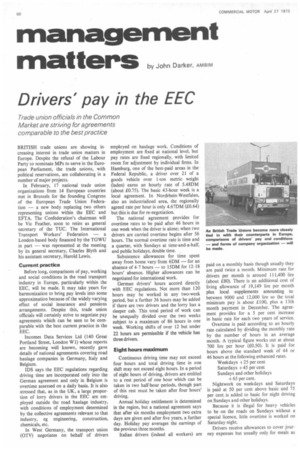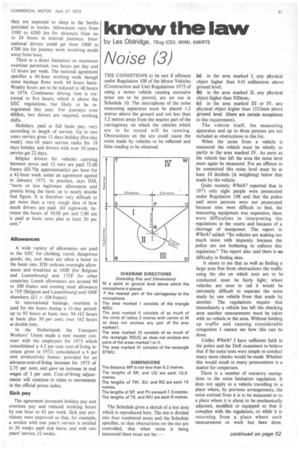management
Page 52

Page 53

If you've noticed an error in this article please click here to report it so we can fix it.
matters by John Darker, AMBIM
Drivers' pay in the EEC
Trade union officials in the Common Market are striving for agreements comparable to the best practice
BRITISH trade unions are showing increasing interest in trade union matters in Europe. Despite the refusal of the Labour Party to nominate MPs to serve in the European Parliament, the trade unions, with political reservations, are collaborating in a number of major projects.
In February, 17 national trade union organizations from 14 European countries met in Brussels for the founding Congress of the European Trade Union Federation — a new body replacing two others representing unions within the EEC and EFTA. The Confederation's chairman will be Vic Feather, soon to retire as general secretary of the TUC. The International Transport Workers' Federation — a London-based body financed by the TGWU in part — was represented at the meeting by its general secretary, Charles Blyth and his assistant secretary, Harold Lewis.
Current practice Before long, comparisons of pay, working and social conditions in the road transport industry in Europe, particularly within the EEC, will be made. It may take years for harmonization to bring pay levels into some approximation because of the widely varying effect of social insurance and pensions arrangements. Despite this, trade union officials will certainly strive to negotiate pay agreements which can be seen to be comparable with the best current practice in the EEC.
Incomes Data Services Ltd (140 Great Portland Street, London WI) whose reports are becoming well known, recently gave details of national agreements covering road haulage companies in Germany, Italy and Belgium.
IDS says the EEC regulations regarding driving time are incorporated only into the German agreement and only in Belgium is overtime assessed on a daily basis. It is also stressed that, as in the UK, a large proportion of lorry drivers in the EEC are employed outside the road haulage industry, with conditions of employment determined by the collective agreements relevant to that industry, eg engineering, construction, chemicals, etc.
In West Germany, the transport union (OTV) negotiates on behalf of drivers employed on haulage work. Conditions of employment are fixed at national level, but pay rates are fixed regionally, with limited room for adjustment by individual firms. In Hamburg, one of the best-paid areas in the Federal Republic, a driver over 21 of a goods vehicle over 1-ton metric weight (laden) earns an hourly rate of 5.48DM (about £0.75). The basic 43-hour week is a local agreement. In Nordrhein-Westfalen, also an industrialized area, the regionally agreed rate per hour is only 4.67DM (£0.64) but this is due for re-negotiation.
The national agreement provides for overtime rates to be paid after 46 hours in one week when the driver is alone; when two drivers are carried overtime begins after 56 hours. The normal overtime rate is time and a quarter, with Sundays at time-and-a-half, and public holidays, double time.
Subsistence allowances for time spent away from home vary from 6DM — for an absence of 4-7 hours — to 15DM for 12-18 hours' absence. Higher allowances can be negotiated for international work.
German drivers' hours accord directly with EEC regulations. Not more than 120 hours may be worked in any two-week period, but a further 36 hours may be added if there are two drivers and the lorry has a sleeper cab. This total period of work can be unequally divided over the two weeks subject to a maximum of 86 hours in one week. Working shifts of over 12 but under 22 hours are permissible if the vehicle has three drivers.
Eight hours maximum Continuous driving time may not exceed four hours and total driving time in one shift may not exceed eight hours. In a period of eight hours of driving, drivers are entitled to a rest period of one hour which can be taken in two half-hour periods, though part of this rest must be taken after four hours' driving.
Annual holiday entitlement is determined in the region, but a national agreement says that after six months employment two extra days are given and after five years, a further day. Holiday pay averages the earnings of the previous three months.
Italian drivers (indeed all workers) are paid on a monthly basis though usually they are paid twice a month. Minimum rate for drivers per month is around 111,400 lire (about £80). There is an additional cost of living allowance of 19,149 lire per month plus local supplements amounting to between 9000 and 12,000 lire so the total minimum pay is about £100, plus a 13th month payment in December. The agreement provides for a 5 per cent increase in basic rate for each two years of service.
Overtime is paid according to an hourly rate calculated by dividing the monthly rate by the number of hours in an average month. A typical figure works out at about 700 lire per hour (£0.50). It is paid for hours above the standard week of 44 or 46 hours at the following enhanced rates.
Weekdays + 25 per cent Saturdays +45 per cent Sundays and other holidays +65 per cent.
Nightwork on weekdays and Saturdays is paid at 50 per cent above basic and 75 per cent is added to basic for night driving on Sundays and other holidays.
Because it is illegal for heavy vehicles to be on the roads on Sundays without a special licence, little overtime is worked on Saturday night.
Drivers receive allowances to cover journey expenses but usually only for meals as they are expected to sleep in the berths provided in lorries. Allowances vary from 1500 to 4200 lire for absences from six to 24 hours in internal journeys. International drivers could get from 2400 to 6700 lire for journey work involving meals away from base.
There is a direct limitation on maximum overtime permitted, two hours per day and 12 hours per week. The national agreement specifies a 46-hour working week though some haulage firms work 44 hours basic. Weekly hours are to be reduced to 40 hours in 1974. Continuous driving time is restricted to five hours, which is above the EEC regulations, but likely to be renegotiated this year. For journeys over 400km, two drivers are required, working shifts.
Holidays, paid at full basic pay, vary according to length of service. Up to two years service gives 15 days holiday (five-day week); two-10 years service ranks for 18 days holiday and drivers with over 10 years service get 22 days.
Belgian drivers for vehicles carrying between seven and 15 tons are paid 75.00 francs (£0.70p approximately) per hour for a 42-hour week under an agreement agreed in January 1973. In practice, says IDS, "more or less legitimate allowances and premia bring the basic up to nearly double that figure. It is therefore very difficult to get more than a very rough idea of how much drivers are paid. All nightwork, between the hours of 10.00 pm and 5.00 am is paid at basic rates plus at least 20 per cent."
Allowances A wide variety of allowances are paid in the EEC for clothing, travel, dangerous goods, etc, and these are often a boost to the basic rate. IDS reckons overnight allowances and breakfast at 160F (for Belgium and Luxembourg) and 175F for other countries. Lunch allowances are around 90 to 100 francs and evening meal allowance is 75F (Belgium and Luxembourg) and 100F elsewhere. (£1 = 104 francs).
In international haulage, overtime is paid for the hours during a I5-day period: up to 93 hours at basic rate; 94-162 hours at basic plus 30 per cent; over 162 hours at double time.
In the Netherlands the Transport Workers' Union made a new master contract with the employers for 1973 which consolidated a 4.3 per cent cost-of-living increase given in 1972; consolidated a 6 per cent productivity bonus; provided for an advance-cost-of-living increase for 1973 of 2.75 per cent; and gave an increase in real wages of 3 per cent. Cost-of-living adjustments will continue to relate to movements in the official prices index.
Sick pay The agreement increased holiday pay and overtime pay and reduced working hours by one hour to 42 per week. Sick pay provisions were improved so that, for example, a worker with one year's service is entitled to 26 weeks paid sick leave, and with two years' service, 52 weeks.












































































































